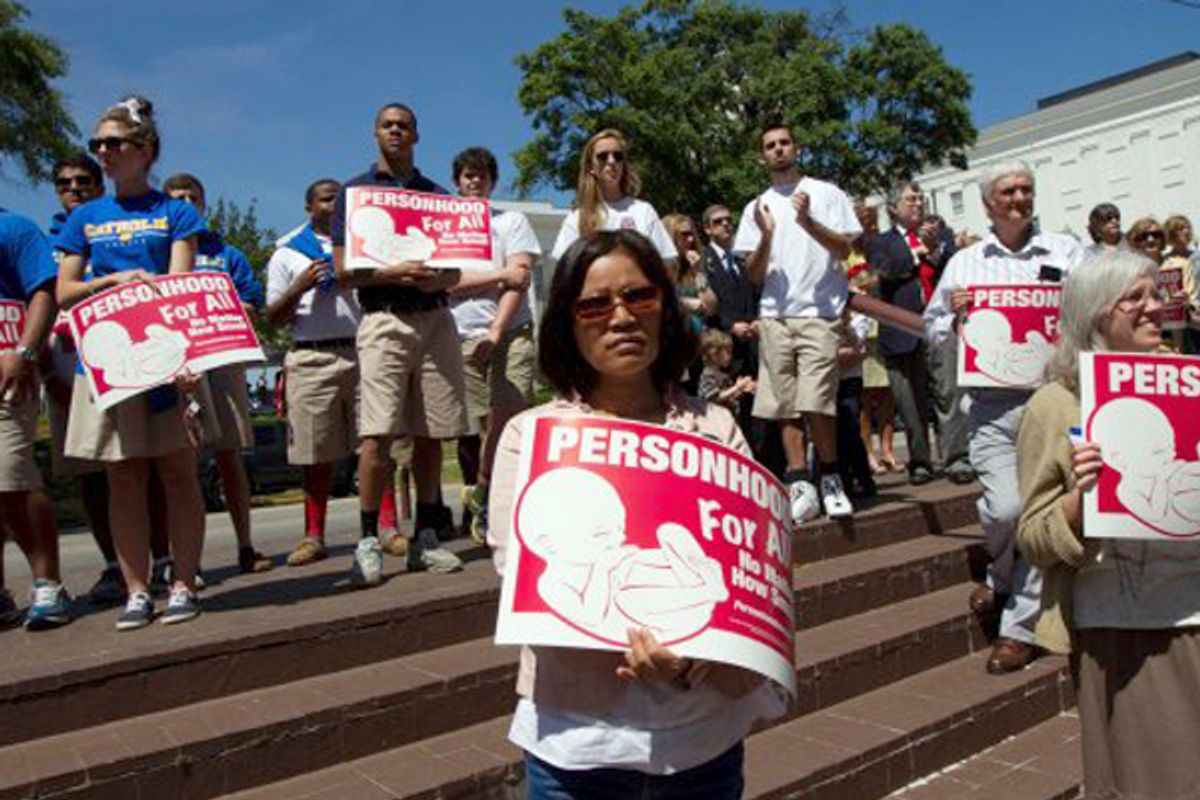The movement to classify fertilized eggs as people has hit a speed bump: "Personhood" won't be on a single ballot this election, in a year with very few reproductive rights-related referenda at all. Anyone hoping that abortion would be used as a wedge issue to turn out so-called values voters for Republicans will have to look to congressional races and the presidential campaign, where reproductive rights have been unusually prominent.
This is not how it was supposed to work for the Colorado-based movement behind the Personhood push, which has been defeated twice in its home state and a third time in Mississippi. At the time that a petition drive succeeded in Mississippi for the 2011 ballot, there was reason to believe that the most conservative state in the union would start making Personhood look like a viable strategy for banning abortion, state by state, and somehow forcing the Supreme Court to consider a new abortion-rights paradigm. That didn't happen. After a campaign that brought grass-roots and national mobilization, focusing on "unintended consequences" involving birth control and infertility, 58 percent of Mississippi voters rejected the measure. This year, the Personhood movement hasn't even been able to get on the ballot in its own state, because so many of its signatures were disqualified. (Antiabortion forces are fighting that call in court, but Colorado's ballots have already been printed.)
There are only a couple of exceptions to the relative paucity of ballot measures this year relating to access to abortion and birth control. Montanans will vote on a parental consent law that was vetoed by the Democratic governor, and which is opposed by the Democratic candidate to replace him. But attracting the most attention is Florida, where Amendment 6, handed down by the conservative Legislature, is seeking to amend the state constitution's privacy provisions. This is more complicated than your average ballot measure, as shown by the fact that the amendment's supporters call themselves "Citizens for Protecting Taxpayers and Parental Rights," and claim that this is about passing a parental-consent law and banning public funding of abortion, whereas opponents are focusing on health exceptions for public employees with life-threatening pregnancies.
Here's what's actually going on. Currently, the Florida Constitution has a broader and more explicit privacy provision than the one that's operating federally. The state doesn't use Medicaid funds to cover abortion, except in the narrow exceptions laid out by the Hyde Amendment. But several parental involvement laws have been struck down by the state Supreme Court on the grounds that they violated minors' right to privacy, which is what's enabling supporters of the measure to say things like “A minor child can’t get an aspirin at school, or a body piercing or a tattoo, but can get an abortion.”
Opponents point out that even if the state doesn't pay for abortions, public employees whose insurance coverage of abortion is currently protected by the constitution would be at risk, with a health exception that doesn't cover plenty of sympathetic cases. The life endangerment exception is a source of contention; No on 6 spokesman Damien Filer uses the hypothetical of a pregnant public schoolteacher with cancer, who won't die tomorrow but whose life would be threatened by continuing the pregnancy. "People read 'life' and they hear 'health,'" says Filer. Seven Florida newspapers have editorialized against the measure.
Both sides face the same challenge: Getting airtime for varied ballot measures in a year like this, with a presidential campaign, a Senate race, and local elections sucking up all the oxygen. "Getting people's attention to have the opportunity to be well informed is a real challenge," Filer admits. "Florida is a battleground state. People are absolutely being bombarded here." So far, based on what voters do know about the measure, only 44 percent of poll respondents said they'd support it -- well short of the 60 percent supermajority needed.
Nationally, the ballot box no longer looks like a particularly attractive place to directly limit reproductive rights. "Since 2005, anti-choice extremists have seen their ballot measures attacking reproductive rights fail 10 out of 11 times in states from Mississippi to South Dakota to North Dakota," points out Samantha Gordon, spokeswoman for NARAL Pro-Choice America. For example, in June, North Dakotans rejected by nearly 30 points a ballot measure intended to undermine contraceptive access provisions in the Affordable Care Act. South Dakotan voters have rejected abortion bans twice.
Arguably, the antiabortion movement has been far more effective in passing incremental state laws -- and using them, with the help of an ever-more conservative Supreme Court, to chip away at Roe, the ultimate target.

Shares